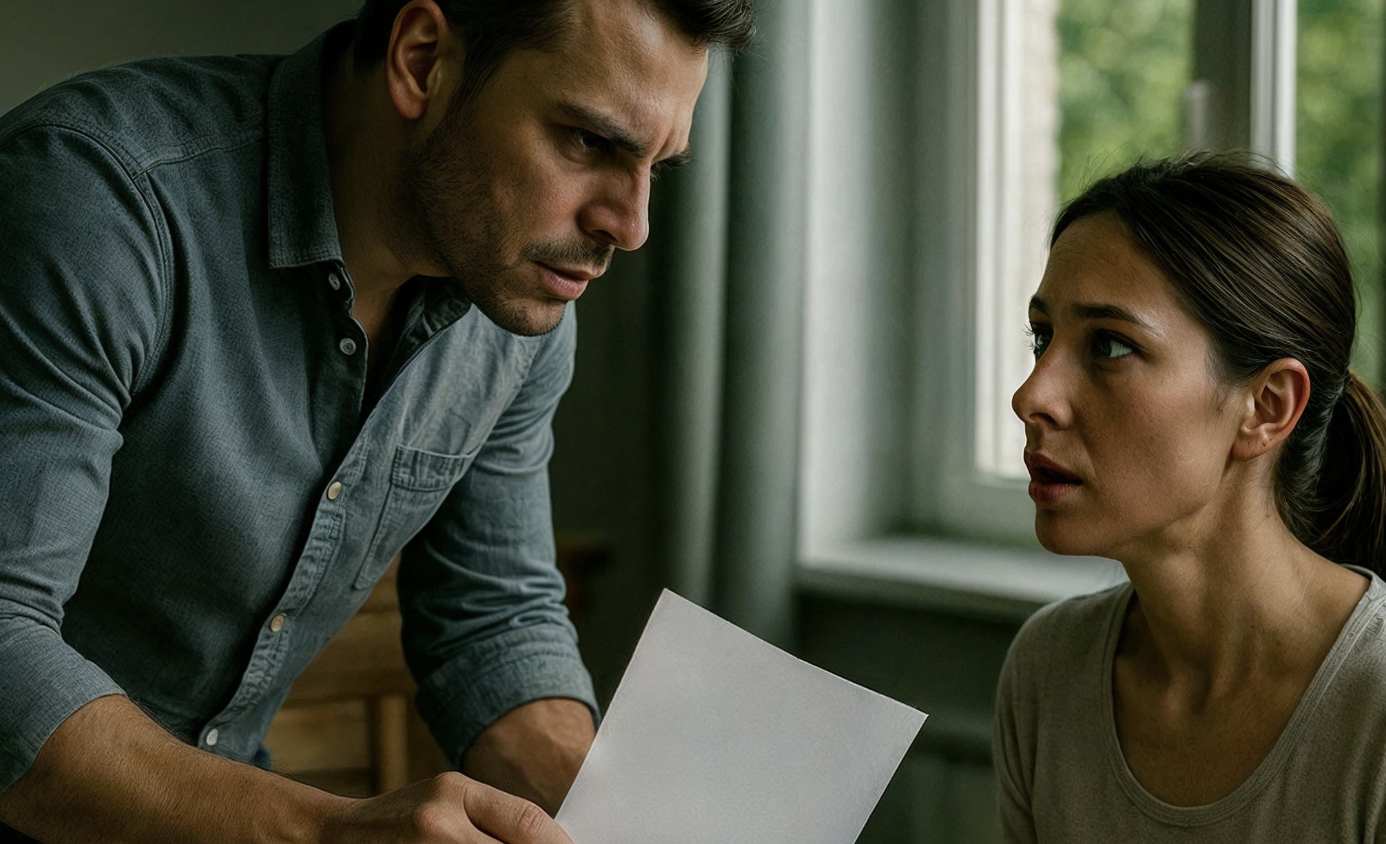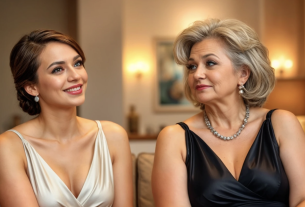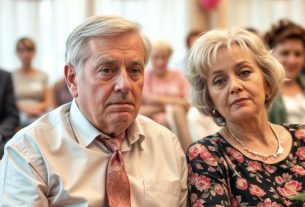Yulia set the kettle on the table and took out some bread—the morning was beginning as usual. A fine October drizzle misted the window; a gray sky hung over the city. Yulia turned on the stove, heated a frying pan, and took eggs from the fridge. Artyom sat at the table, scrolling through something on his phone, frowning. Yulia noticed he was tense this morning, but decided not to ask questions. Maybe it was something at work, she thought.
Yulia cracked the eggs into the pan, salted them, stirred. Artyom put his phone away, poured himself tea, and stayed silent. Yulia set the scrambled eggs on plates and sat down across from her husband. They began to eat. Artyom chewed slowly, staring off to the side. Yulia ate half her portion and dabbed her lips with a napkin.
Her husband Artyom sat opposite her and suddenly, without lifting his eyes, said:
“Mom is in debt. Ten million. We’ll have to sell your cottage.”
Yulia froze with the cup in her hand, not immediately understanding what he’d said. The words were delivered in an everyday tone, as if Artyom were announcing the weather or that they were out of sugar. Yulia slowly set the cup on its saucer and looked at her husband. Artyom still wouldn’t meet her eyes; he poked at his eggs with his fork.
“What?” Yulia asked calmly, trying to process what she’d heard.
At last Artyom lifted his eyes.
“I’m saying my mom has problems. She invested in a business, and it tanked. Now there’s debt. A big one.”
Yulia frowned.
“Ten million?”
“Yes.”
“And what does my cottage have to do with it?”
Artyom sighed and set his fork aside.
“Yulya, you understand. Mom needs help. If the debt isn’t repaid, they’ll take her apartment. The collectors are already calling and making threats.”
Yulia leaned back in her chair. Her head was spinning. Her mother-in-law had gotten into debt, and Artyom was proposing to sell Yulia’s cottage. The cottage she had inherited from her grandmother. The cottage where Yulia had spent all her childhood, where she went every summer, where her warmest memories lived.
Artyom explained that his mother had put money into an acquaintance’s business, and it had gone under. His mother, Valentina Sergeyevna, had always been active and energetic. At sixty-three she looked younger, took care of herself, wore makeup, dressed fashionably. She never sat still, always looking for ways to make money—dabbling in multi-level marketing one moment, then in some shady venture the next. Artyom had told her more than once to be careful, but she wouldn’t listen.
“What kind of business?” Yulia asked.
“Well, some investment story. Mom put money into a friend’s startup. He promised the moon, profits in six months. And in the end he vanished. Now Mom’s left with the debt.”
“Did she take out a loan?”
“Yes. For ten million. Using the apartment as collateral.”
Yulia closed her eyes. Ten million secured by the apartment. Valentina Sergeyevna lived in a three-room flat in the city center, worth about twenty million. If the bank took it, her mother-in-law would be out on the street.
Yulia asked what any of this had to do with her. Artyom shrugged.
“Yulya, if we don’t help, Mom will lose her apartment. We have to bail her out.”
“Bail her out?” Yulia repeated. “How exactly?”
“Sell the cottage. The money will go to pay off the debt.”
Yulia straightened and looked at her husband with cool surprise.
“You’re seriously proposing to sell my property to cover her gambles?”
Artyom scowled.
“What gambles? Mom got into a tough spot. People get deceived; it happens.”
“It’s ‘normal’ to take out a ten-million loan with no way to repay it?”
“She counted on the profits!”
“And she didn’t vet her partner? Didn’t consult a lawyer? Just took him at his word?”
Artyom raised his voice.
“What, you’re not human? This is my mom! My mother! She’s in trouble!”
Yulia stood up and carried her plate to the sink. Her hands trembled, but she kept control. Artyom also stood and came over to her.
“Yulya, I understand the cottage matters to you. But it’s just a house. And my mom is a living person. She has nowhere to go.”
Yulia turned to her husband.
“Artyom, the cottage isn’t just a house. It’s the only thing I have left from my grandmother. It’s mine. And you have no right to dispose of it.”
“I’m not disposing of it! I’m asking for help!”
“Help? You’re presenting me with a fait accompli! You’ve already decided the cottage will be sold!”
Artyom fell silent. His face flushed; red blotches spread down his neck. Yulia could see he was angry but trying to hold it in.
“All right,” he forced out. “All right. I haven’t decided. I’m proposing. Let’s discuss it calmly.”
Yulia folded her arms across her chest.
“There’s nothing to discuss. I won’t sell the cottage.”
“Then what do we do? Mom doesn’t have time! The bank has already started repossession!”
“Let her sell her apartment,” Yulia replied. “Pay off the debt and buy something smaller.”
Artyom stared at his wife.
“Sell the apartment? Do you hear yourself? Mom has lived there her whole life! That’s her home!”
“And the cottage is my home. I’m not going to lose it over someone else’s mistakes.”
“Someone else’s?! She’s my mother!”
“Yes, yours. Not mine. I didn’t take the loan, I didn’t invest in shady schemes. Why should I pay the price?”
Artyom clenched his fists, breathing hard.
“Because we’re a family! In a family you help each other!”
“You help when you’re asked—not when you’re put before a done deal,” Yulia answered.
Artyom turned and left the kitchen. Yulia heard him go into the bedroom and the door slam. She stood at the sink. The trembling in her hands wouldn’t stop. She turned on the water, splashed her face, and dried it with a towel.
The cottage. Grandma’s cottage. A two-story house on the edge of town, with a big plot, a garden, a veranda. Her grandmother had died three years ago and left it to Yulia in her will. Yulia was her only granddaughter; her grandmother had raised her almost alone—Yulia’s parents worked around the clock, and her grandmother took the girl for the whole summer. There, at the cottage, Yulia learned to read, tasted blackcurrant jam for the first time, spent the best years of her childhood. When her grandmother died, Yulia grieved long and hard. The cottage became sacred to her, a place of memory. Sometimes Yulia went there, sat on the veranda, and remembered her grandmother. Selling the cottage would be like betraying that memory, like erasing the past.
Yulia went back to the living room and sat on the couch. Artyom came out of the bedroom and sat across from her. He looked tired, shoulders slumped, eyes red.
“Yulya, I’m sorry I yelled,” Artyom said quietly. “I just don’t know what to do. Mom called all week, crying. Says she’s scared. The collectors come and threaten her. She’s alone and she’s afraid.”
Yulia looked at her husband.
“Artyom, I understand this is hard for you. That you’re worried about your mother. But the cottage is my inheritance. I can’t just take it and sell it.”
“Not ‘just like that.’ To help.”
“There are other ways to help.”
“Like what?”
Yulia thought. There were options, but all of them required sacrifices from Valentina Sergeyevna, not from Yulia.
“Let her sell her apartment. Pay off the debt. Buy a studio on the outskirts. Or rent. Or stay with us for a while until she figures something out.”
Artyom shook his head.
“Mom won’t agree to sell the apartment. That’s her home.”
“And the cottage is my home,” Yulia repeated. “Why are my interests less important?”
“Because Mom’s in a critical situation! She’s about to lose her home!”
“Then let her resolve her own problems. She’s an adult. She took the loan; she invested. Let her deal with it.”
Artyom paced the room.
“You’re cruel.”
Yulia sighed.
“Maybe. But I won’t sacrifice what’s mine for someone who can’t take responsibility for her actions.”
“She’s my mother!”
“I understand. But that doesn’t obligate me to save her at my expense.”
Artyom stopped and looked at his wife.
“So you refuse to help?”
“I refuse to sell the cottage. If you want to help your mother, look for other options.”
“There aren’t any! We don’t have that kind of money!”
“Then your mother should sell her apartment.”
Artyom ground his teeth and left the room. Yulia heard him putting on his jacket, his shoes, the front door slamming. He was gone. Yulia was alone.
She spent the whole day thinking. Work wouldn’t come; her mind circled the same things: the cottage, her mother-in-law, the debt. She understood Artyom was pressing on her pity, trying to make her give in. But Yulia didn’t want to yield. The cottage was hers and hers alone. Only Yulia could decide whether to sell.
That evening Artyom came home late, around ten. He was sober but grim. He went to the bedroom, lay down on the bed, and buried himself in his phone. Yulia followed him in.
“Artyom, we need to talk.”
“About what?” he asked without looking up.
“About your mother. About the situation.”
“You’ve said everything already. You won’t help.”
“I didn’t say I wouldn’t help. I said I won’t sell the cottage.”
Artyom looked up.
“That’s the same thing.”
“No. It isn’t. I can help with money if I have any free funds. I can lend if there’s a way to repay. But selling the cottage is an extreme measure I won’t take.”
Artyom sat up.
“You don’t have spare money. I don’t either. The cottage is the only option.”
“Only for whom? For you? For your mother?”
“For all of us.”
Yulia sat on the edge of the bed.
“Artyom, listen. I understand this is hard. That you’re worried. But I’m not ready to give it up so your mother can cover the consequences of her irresponsibility.”
Artyom smirked.
“It’s not the last cottage on earth! We’ll sell it and buy another!”
Yulia shook her head.
“No. We won’t. Because this cottage can’t be replaced. It’s not just a building. It’s where I grew up. Where Grandma lived. Where the memories are.”
Artyom waved a hand.
“Memories are in your head, not in the walls.”
Yulia stood and looked at him.
“Maybe for you. Not for me.”
Artyom said nothing. Yulia left the bedroom and lay down on the living-room couch. She couldn’t sleep. She stared at the ceiling and thought. What would happen next? Artyom wouldn’t back down. Neither would his mother. Valentina Sergeyevna surely already knew about her son’s proposal. Surely she expected Yulia to agree. And if not? Then what? Divorce? A scandal?
Yulia closed her eyes. She had married Artyom five years ago. He was a good man, caring, attentive. But now, with the cottage at stake, Yulia saw a different Artyom. A man willing to sacrifice his wife’s interests for his mother’s. A man who wouldn’t hear her, who didn’t understand her feelings, who pushed, demanded, accused.
Yulia sighed. Tomorrow would be a new day. Tomorrow she would have to talk again, to explain, to defend her rights. She didn’t know if she would have the strength. But she wasn’t going to retreat. The cottage would stay with her. Whatever it took.
In the morning Artyom left for work without a word, without even saying goodbye. Yulia got ready too and went to the office. The whole day passed in tension. She knew the conflict wasn’t over, that the same conversation would repeat that evening. Artyom wouldn’t back down, and neither would his mother.
That evening Yulia came home before her husband. She went into the bedroom, opened the closet, and took out a folder with documents: the certificate of inheritance, the deed for the plot her grandfather had once bought, the title to the cottage. Everything was in Yulia’s name. Calmly she laid the documents on the table and sat down nearby. Artyom came home half an hour later. He walked into the room, saw the papers, and frowned.
“What’s this?”
Yulia looked up.
“The cottage documents.”
“Why did you take them out?”
“To remind you who owns that house.”
Artyom stepped closer and picked up the certificate, skimmed it.
“I already know the cottage is yours. That doesn’t change the fact Mom needs help.”
Yulia said evenly:
“This house was built with my grandfather’s money. Neither you nor your mother has anything to do with it.”
Artyom tossed the paper onto the table.
“What difference does it make who built it? We’re not talking about the past, we’re talking about now! Mom’s in trouble!”
“Mom’s in trouble because of her own actions.”
Artyom grabbed his head.
“All you care about are papers, and there’s a person drowning!”
Yulia looked at her husband steadily.
“She’s not drowning—she’s paying for her decisions.”
Artyom exhaled sharply and turned away. Yulia could see he was boiling inside, fighting to keep control. He paced, stopped by the window.
“So you won’t help?”
“I won’t sell the cottage. If there are other ways to help, I’m ready to discuss them.”
“There are no other ways!”
“There are. Your mother can sell her apartment.”
“I told you, she won’t agree!”
“Then that’s her problem.”
Artyom turned and looked at his wife.
“You’re heartless.”
Yulia stood.
“Maybe. But I won’t lose what’s dear to me for someone who can’t think through the consequences.”
Artyom said nothing. He left the room, slamming the door. Yulia stayed at the table. The documents lay before her—clear, straightforward, indisputable. The cottage belonged to Yulia. No one could take it. No one had the right to demand its sale.
Half an hour later the phone rang. Yulia picked it up: her mother-in-law’s name lit the screen. Valentina Sergeyevna. Yulia answered.
“Yes, I’m listening.”
“Yulenka, it’s me,” her mother-in-law’s voice was agitated and trembling. “Artyom told me everything. Are you really refusing to help?”
Yulia paused.
“Valentina Sergeyevna, I’m not refusing to help. I’m refusing to sell the cottage.”
“But that’s the only way! I have no other options!”
“You do. You can sell your apartment.”
“My apartment?! Are you out of your mind?! I’ve lived there my whole life!”
“And I spent my childhood at the cottage. It’s my grandmother’s legacy. It’s the only thing I have from her.”
Valentina Sergeyevna raised her voice.
“You’re obliged to help; that’s the duty of family!”
Yulia answered calmly:
“Your family’s debts aren’t mine. And the house will not be sold.”
“How can you say that?! I’m your husband’s mother! I’m not a stranger to you!”
“Valentina Sergeyevna, you took out the loan without my involvement. You invested in a dubious project without my consent. Now you want me to pay for your mistakes. That isn’t fair.”
“Unfair?! And abandoning an old woman in trouble—is that fair?!”
“You’re sixty-three, not old. And you’re not in trouble—you’re in a situation you created. You have an apartment you can sell to pay off the debt. That’s the reasonable solution.”
“I won’t sell my apartment!”
“Then that’s your choice.”
Silence. Then, quietly, with a threat in her voice:
“You’ll regret this. Artyom won’t forgive you for treating his mother this way.”
“Maybe,” Yulia said. “But I won’t change my decision.”
Her mother-in-law hung up. Yulia set the phone on the table and exhaled. The conversation had been heavy, but necessary. Valentina Sergeyevna needed to understand Yulia wouldn’t give in.
Artyom came back to the kitchen a few minutes later. His face was red; his eyes darted. He stopped in front of his wife.
“Mom called me. She said you refused to help.”
“I refused to sell the cottage. That’s not the same thing.”
“For her it is the same!”
“Then she needs to look for other options.”
Artyom exploded—started packing his things, shouting that he couldn’t live like this. He rushed around, grabbing clothes and throwing them into a bag. Yulia stood in the hallway watching. Artyom hurled accusations, called her selfish, heartless, cold. Yulia said nothing. He zipped the bag, grabbed his jacket, turned to her.
“I’m leaving! I can’t stay here anymore!”
Yulia calmly handed him the keys to his car and said:
“Go to your mother. Discuss how you’ll get her money back.”
Artyom snatched the keys and looked at Yulia with hatred.
“You’ve destroyed our family!”
“No,” Yulia replied. “You did. When you decided my property was a way to solve your mother’s problems.”
Artyom turned and left, slamming the door. Yulia heard him going down the stairs, the building door slam, the car start. Then silence.
She went to the living room and sat by the window. Evening had fallen outside; the city was sinking into darkness, streetlights flaring one by one. Yulia watched the street and thought. Artyom had gone. Maybe for good. Maybe for a while. She didn’t know. But for the first time in a long while she felt not anxiety but certainty—she would not let anyone dispose of what was rightfully hers.
The cottage would remain hers. The memory of her grandmother, of childhood, of warm summer days would remain untouched. Yulia would not betray it for the sake of someone else’s mistakes. Even if the price was her marriage.
A week passed. Artyom neither called nor wrote. Yulia didn’t reach out either. She understood he was waiting for her to cave, to call, to agree. But Yulia had no intention of surrendering.
On the eighth day, Valentina Sergeyevna called. She sounded calmer now, her voice tired.
“Yulya, I’ve been thinking. Maybe we can find a compromise?”
“What kind?”
“Well, you sell the cottage, and Artyom and I will pay you back. Gradually. In installments.”
Yulia gave a wry chuckle.
“Valentina Sergeyevna, you took a loan for ten million and couldn’t repay it. Where would you get the money to repay me?”
“We’ll think of something!”
“No. I won’t sell the cottage.”
“Then what am I supposed to do?! You want me to end up on the street?!”
“I want you to sell your apartment and resolve your problem yourself.”
Her mother-in-law raised her voice again.
“I won’t sell the apartment! It’s my home!”
“And the cottage is my home. And I won’t sell it.”
She was silent for a moment, then forced out:
“So you’re ready to ruin my son’s family for the sake of some house?”
“I’m not ruining a family. I’m defending my property rights. And you and Artyom are the ones ruining the family by demanding the impossible from me.”
Her mother-in-law hung up. Yulia put down the phone and exhaled. The same conversation, over and over. She knew her mother-in-law wouldn’t give up. Neither would Artyom. But Yulia had no intention of yielding.
A few days later Artyom texted: let’s meet, we need to talk. Yulia agreed. They met at a café, neutral ground. Artyom looked tired, thinner, with dark circles under his eyes. He ordered coffee, sat in silence for a long time, then said:
“Mom sold the apartment.”
Yulia raised her eyebrows.
“Really?”
“Yes. Found buyers quickly. It’s a good flat, city center. Sold it for twenty million. Ten went to pay off the debt; ten remained. Mom bought a studio on the outskirts for seven million. She set aside three million to live on.”
Yulia nodded.
“A sensible decision.”
Artyom looked at his wife.
“You were right. Mom could solve the problem herself. She just didn’t want to admit it.”
“I know.”
Artyom paused, then said:
“I’m sorry. I was wrong. I shouldn’t have demanded you sell the cottage. It’s your inheritance, your property. I had no right.”
Yulia looked at her husband.
“Artyom, it isn’t only about the cottage. It’s that you didn’t hear me. You didn’t take my opinion into account. You simply decided your mother mattered more than my feelings.”
“I understand. I was blinded by fear for her. I thought if I didn’t help, she’d be ruined. But you showed me there were other options.”
Yulia took a sip of coffee.
“I didn’t want to break your family. I just didn’t want to sacrifice what’s mine for other people’s mistakes.”
“That’s fair,” Artyom nodded. “And I get it now. Probably too late.”
Yulia looked at him.
“Not too late. If you truly understand.”
Artyom reached out and covered her hand with his.
“I do. I promise I will never again make decisions that concern both of us without your consent.”
Yulia squeezed his fingers.
“Then let’s try again.”
Artyom smiled for the first time in a long while.
“Let’s.”
He came home a few days later with apologies, flowers, promises. Yulia took him back, with one condition: if anything like this happened again, she wouldn’t give a second chance. Artyom agreed.
Valentina Sergeyevna moved into her new apartment and settled in. She no longer called Yulia with demands or pressed on her pity. Her relationship with her daughter-in-law became cooler, more distant, which suited Yulia just fine.
The cottage stayed with Yulia. She went there sometimes, sat on the veranda, remembered her grandmother. The place remained sacred, untouchable. And now Yulia knew for certain: no one would ever make her give up what belonged to her by right. Not her husband, not her mother-in-law, not circumstances. Yulia had learned to say no. She had learned to defend herself. And that was the most important lesson of her life.



